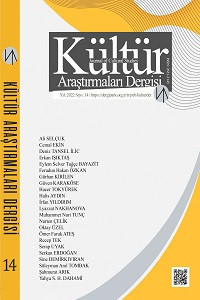Timely Voices: Romance Writing in English Literature
Romans ilk olarak 12. yüzyılda Fransa’da ortaya çıkan ve efsanevi şövalyelerin tecrübe ve maceralarını sadakat, onur ve saraylı usulü aşk gibi idealize edilmiş davranış kuralları çerçevesinde anlatan bir edebi türdür. Bu tür erken modern döneme dek popülerliğini korumuş olsa da takip eden yüzyıllarda drama, şiir ve roman gibi edebi türlerin daha baskın hale gelmesiyle eski cazibesini yitirmiştir. Bununla birlikte, değişken yapısı sayesinde romans çeşitli türlere sızarak varlığını günümüze dek sürdürmeyi başarmıştır. Kimi edebiyat araştırmacıları romansı başlı başına bir türden ziyade, bir üslup, bir yazım tekniği veya bir strateji olarak ele alır. Bu çalışmada incelenen on dört eleştirel makalede de romans, edebi bir tür olarak ele alınmaz. Romans, bir kaynak ve vasıta olarak yorumlanır; çünkü romans hikâyelerin, anlatı kalıplarının, tarzlarının ve stratejilerinin bir deposu olarak görülür ve esnek ve kapsamlı yapısı üç ana tür olan drama, nesir ve şiirde yazmanın bir kolaylaştırıcısı olarak değerlendirilir. İncelemede, Goran Stanivukovic editörlüğündeki edebi eleştiri çalışması Timely Voices: Romance Writing in English Literature tanıtılır ve değerlendirilir.
Anahtar Kelimeler:
edebiyat, edebi tür, romans, edebiyat eleştirisi, edebiyat teorisi
Timely Voices: Romance Writing in English Literature
Having first emerged in the 12th century in France, romance depicts the adventures of the legendary knights within the framework of an idealized code of conduct such as loyalty, honour, and courtly love. Although the genre maintains its popularity till the early modern age, it lost its appeal in the following centuries as such literary genres as drama, poetry, and novel became more prominent. Owing to its mercurial structure, however, infiltrated into myriad genres, romance has managed to survive until the present age. Some literary scholars define romance as a mode, as a literary device, or as a strategy rather than an autonomous genre. In the collection of fourteen critical essays examined in this study, romance is not handled as a literary genre, either. It is interpreted as a resource because romance is seen as a repository of stories, narrative patterns, styles, and strategies and its flexible and comprehensive structure is evaluated as facilitator of writing in the three main genres: drama, prose, poetry. This study introduces and evaluates Timely Voices: Romance Writing in English Literature edited by Goran Stanivukovic.
Keywords:
literature, literary genre, romance, literary criticism, literary theory,
___
- Archibald, Elizabeth (2004). “Ancient Romance”. A Companion to Ro-mance from Classical to Contemporary. Ed. Corinne Saunders. Ox-ford: Blackwell, 10-25.
- Aydoğdu-Çelik, Merve (2019). Female Agency in the Early Modern Ro-mance in British and Italian Context: Lady Mary Wroth, Anna Weamys, Moderata Fonte and Giulia Bigolina. Doktora Tezi. Ankara: ODTÜ Sosyal Bilimler Enstitüsü.
- Beer, Gillian (1970). The Romance. London: Methuen.
- Frye, Northrop (2000). Anatomy of Criticism: Four Essays. Princeton: Princeton University Press.
- Fuchs, Barbara (2004). Romance. New York: Routledge.
- Klarer, Mario (1999). An Introduction to Literary Studies. London and New York: Routledge.
- Parker, Patricia (1979). Inescapable Romance: Studies in the Poetics of a Mode. Princeton: Princeton University Press.
- Stanivukovic, Goran (2017) ed. Timely Voices: Romance Writing in English Literature. Montreal: McGill-Queen’s University Press.
- ISSN: 2651-3145
- Yayın Aralığı: Yılda 4 Sayı
- Başlangıç: 2018
- Yayıncı: Mehmet Ali YOLCU
Sayıdaki Diğer Makaleler
Bir Kültün Özellikleri: Türklerde Su Kültü
Dans Etmek ya da Etmemek: Kuzey Yunanistan Sınırında Dans İkilemi
Ioannis MANOS, Çevirmen: Bahar Dilara SEMİZ
Yaşar Kemal'in Romanlarında Defin Ritüellerinin Sosyal-Kültürel Temelleri
İncesu Köyü: Yurtdışı İşçi Göçünün Köydeki Toplumsal Değişmeye Etkisi
Timely Voices: Romance Writing in English Literature
Geleneğin İcadı: Divançe ve Divan
Metinden Okura: Okur-Tepki Teorisinin Robert Browning’in "My Last Duchess" Şiirine Uygulanması
Bir Alt Kültür Olarak Rock Kültürünün Türkiye’deki Evrimi
